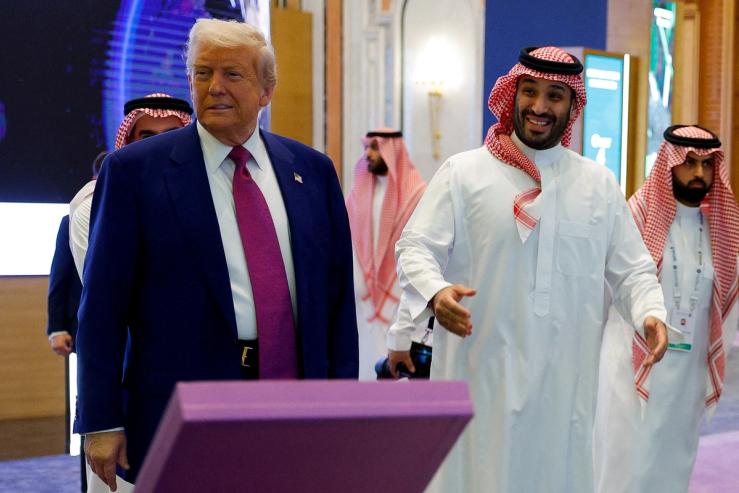Matthew’s view
Saudi Arabia’s crown prince will do more than tend to a historic alliance during his meeting with US President Donald Trump this week: He is looking to position the kingdom he is likely to rule for decades to come as an indispensable ally. Billions for the US defense industry? Check. Billions more to back US artificial intelligence champions investing at home and abroad? Check. And don’t forget money for US gas exports and nuclear technology.
But this is no longer just a commitment to recycle Saudi petrodollars, freely flowing around the globe under the protection of an American-led global order, into US assets. Prince Mohammed bin Salman wants to redefine the US-Saudi alliance as a partnership that will shape the future.
From Riyadh’s perspective, doubling down on Washington will help its most important strategic partner beat China on everything from AI to security, energy, and critical minerals.
The kingdom hopes to use reserves of uranium and rare earth metals to tie itself into US supply chains eager to keep China out. And in a show of diplomatic usefulness, Saudi Arabia played a role hosting US-led talks to try to end the Russia-Ukraine war, offered help in resolving the Sudan conflict, and served as a temporary home for US military equipment in the lead up to Iran’s strike on Qatar’s Al-Udeid base. Saudi Arabia, through its oil sales, is also the swing vote in any efforts to shift global trade away from a reliance on the US dollar — a key concern of the Trump administration.
All of that improves the Saudi pitch to the US at a time when its crude reserves are no longer big enough to fulfil MBS’ ambitions. In Trump’s first term, Saudi Arabia was so flush it needed to find other places to invest surpluses. Now it spends so much at home, it needs other nations to back MBS’ domestic vision.
While closer — or the threat of closer — ties to Beijing are sometimes seen as a bargaining chip for Riyadh, all sides know that Chinese investment is not going to “Make Saudi Arabia Great Again.” For that, MBS needs the US. In that sense, the future of the two countries may be more entwined than ever.
Once the pomp and ceremony of this week’s visit has passed, though, the longer term challenge for the crown prince will be ensuring that all the goodwill he has built up in the Trump era survives into future administrations.
In this article:
Room for Disagreement
Saudi Arabia is facing a complex balancing act as it seeks to manage its preference for a US-focused security partnership with rising economic ties to China, Dr Sanam Vakil writes in a Chatham House report. An increasingly multipolar world order will require the kingdom to build a variety of alliances and no longer rely on just one country — the US — for its security, as evidenced from its recent mutual defence pact with Pakistan.
On top of that, Saudi Arabia sees itself as a leader of the Islamic world and the Global South. It’s a dialogue partner in the Shanghai Cooperation Organization and has been invited to join BRICS, although it has yet to accept. The kingdom’s posturing aligns with its goal of having an assertive role in foreign policy globally across a broader web of alliances.
Notable
- Trump’s pledge that the US will defend Qatar has set a “new benchmark for security relationships between the Gulf” and Washington, James Jeffrey and Elizabeth Dent write in a Foreign Affairs essay.
- The crown prince and the president have four main topics of discussions: a defense pact, business and nuclear cooperation, and normalization with Israel. Analysts at the Washington-based Arab Gulf States Institute break down each track.


